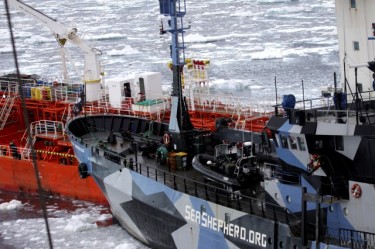Japanese whaling authorities and anti-whaling activists are trading blame after a harpoon ship collided with two vessels from the marine conservation group Sea Shepherd [1] in Antarctic waters on February 20, 2013.
The incident offered a glimpse into the country's complicated relationship with whaling as many Japanese Web users, regardless of their opinion on the practice, lined up against Sea Shepherd and slammed what some called the world's selective outrage over Japanese whaling.
Activists from US-based Sea Shepherd maintain that the 8,000-tonne factory ship Nisshin Maru rammed two of the organization's vessels [2], the Bob Barker and the Steve Irwin, as well as its own refueling ship, the South Korean tanker ship Sun Laurel.
Japan's Institute of Cetacean Research [3], the country's quasi-governmental whaling body, disputes the anti-whaling group's version of events, claiming that Sea Shepherd vessels made a “foolhardy” attempt to sabotage [4] the Nisshin Maru's refueling effort, provoking the collision.
No one was injured in the incident.
The International Whaling Commission banned commercial whaling in 1986 [5]. In recent years, Japan has caught between 400 and 1,000 whales per year [6] as part of what it calls “scientific research” and the meat is sold as a byproduct on the open market in Japan, despite the country's waning appetite for whale meat. Critics [7] have called the Institute of Cetacean Research a ruse to continue commercial whaling despite the moratorium.
Critics have also accused Sea Shepherd of using aggressive, at times violent tactics to stop Japan's whaling. Days after this latest clash, the 9th U.S. Circuit Court of Appeals, ruling on an unrelated case filed against the organization by Japan's Institute of Cetacean Research in November 2011, labeled them as pirates [8].
After the collision, many Japanese Web users took to social media to condemn Sea Shepherd without explicitly professing support for their homeland's practice whaling, a sign of the Japanese people's nuanced perspective on the practice.
In an online poll on newly launched polling platform zzhh.jp [10] [ja], users were asked to answer whether they thought Sea Shepherd's intervention of Japan's whaling is a criminal act. Many of the 210 users who participated answered that they consider it a crime regardless of if they are for or against whaling. User @naoki_ma [11] commented:
調査捕鯨に反対するのは自由だが、彼らの行動はどうひいき目に見ても国際法に違反する行為。欧州の捕鯨国に対して批判活動を展開していなことを見れば人種蔑視を感じざるを得ない。正当防衛を含めた毅然とした対応を
Japanese media coverage of opposition to whaling has been relatively scant compared to the amount of coverage devoted to the subject by international media, as the case has been for other marine mammal hunts [12] by Japan.
But the news of the clash between the whaling ship and Sea Shepherd ships dominated headlines in Australia, which is one of Sea Shepherd's most prominent supporters. Japanese author Kaz Hagiwara (@reservologic [13]), who resides in Australia, noted on Twitter:
@reservologic [14]: 今朝から豪州のニュースは、日本の調査捕鯨船が豪州領海内でシーシェパードを暴力的に妨害したという記事で持ち切り。国政選挙が近くなると出てくる日本の捕鯨問題はオーストラリア政府の定番スピンなのだった。そういやギラード首相の支持率は最低。http://bit.ly/VJ8KMg
@reservologic [14]: Media coverage in Australia this morning flooded with the news that Japan's whaling research ship violently intervened with the Sea Shepard in the Australian territorial waters. The issues surrounding Japan's whaling always come up almost routinely when an election is near. Note that the approval ratings of PM Julia Gillard is in a slump now.
But despite the Japanese's clear cut opposition to Sea Shepherd, opinions about the actual matter of whaling aren't so unanimous. Some wonder about the inconsistency of plentiful whale meat available in the online [15][ja] and offline marketplace as a byproduct of whale research. Twitter user @one_one_nine [16][ja] asked:
@one_one_nine [17]: 調査捕鯨といいながら、市場には相当量出回っているのは何故なんだ? RT @lllpuplll: 捕鯨はだめ。クジラさんが可哀想、といいながら、ブタさんやウシさんを平気で食らう日本。日本人は、自分の足下をよく見つめるべき。
@one_one_nine [17]: Then why is it that there is a substantial amount of whale meat available in the market while they claim that it is for research purposes? QT@lllpuplll: No whaling because it's a pity while you devour piggies and cows? Japanese should be more aware of where they stand.
Japan's financial support of whaling has also attracted criticism at home that funds could be better spent elsewhere. Miyako Maekita (@maekitam [18]), who heads green advertising agency Sustena, discussed [19] [ja] on Twitter in October 2012 how the budget for reconstruction efforts in Ishinomaki [20], which suffered serious damage from the massive earthquake and resulting tsunami [21] in March 2011, was diverted to whaling instead:
@maekitam [19]:【23億円】震災復興予算が南極海調査捕鯨事業へ23億円。被災捕鯨地宮城県石巻市「恩恵ない」と指摘。調査捕鯨費18億円+シーシェパード対策費4億8千万円。捕鯨と鯨肉販売行う日本鯨類研究所は水産庁次長OBが理事長、役員10人うち3,4人が天下り。これ火事場泥棒。#今日の数字
@maekitam [19]: 2.3 billion yen was allocated to Arctic research whaling from the disaster reconstruction budget. Disaster-stricken Ishinomaki city in Miyagi Prefecture [whaling area] protested that “this does not help our community.” 1.8 billion yen for research whaling + 480 million yen for Sea Shepherd counter measure budget. The Institute of Cetacean Research, which handles whaling and selling whale meat, consists of former-government officials “parachuted” in. The former vice-director for the fisheries agency sits as chief director, three to four “parachuted” in former government officials of all 10 members. This is an act of thief.
But defenders of the practice, despite Japan's image in the press as a cruel whaler, point to Japanese folk belief that considers whales as divine [22] [ja]. A Twitter user commented [23]last year that Japan holds memorials for dead whales in certain areas:
東北の鯨神社では日本が江戸時代から現在に至るまで捕鯨した全ての鯨を奉っており、全てに戒名を与えている。 日本は世界で最も鯨を大切に扱い、鯨の生命一つ一つを歴史に残し、長年にわたって鯨の慰霊をしている。しかし、シーシェパードががそのような事をしたと言う話は一回も聞かない。
